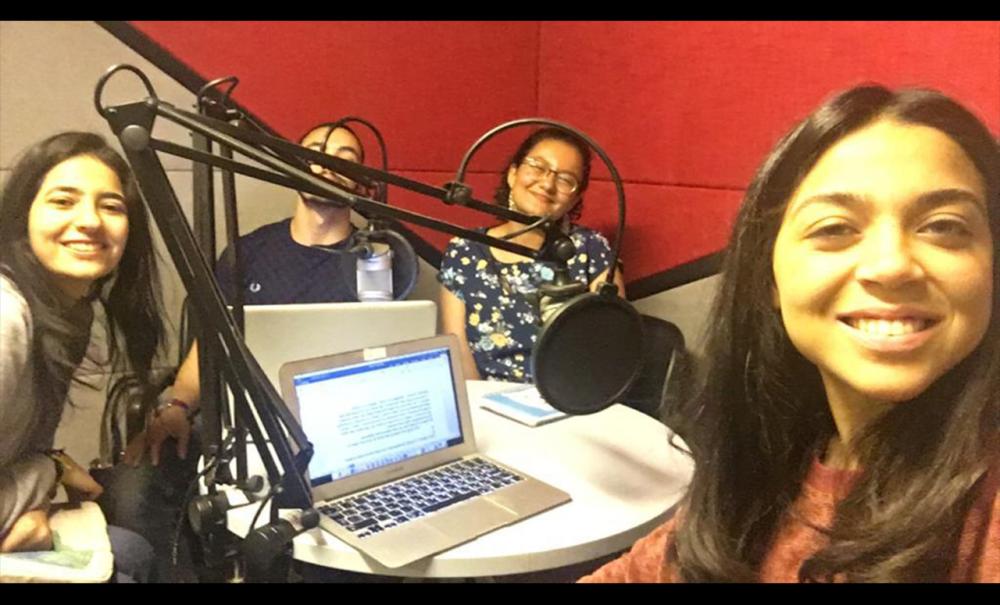
Podcasts in Business Education: A Creative and Multidisciplinary Learning Experience by Students
Podcasts are becoming increasingly widespread in our present day, particularly in higher education, for the most part as a teaching and learning tool. However, here at AUC School of Business podcasts are also used as a form of assessment where students are evaluated based on their own podcast productions.
Instructional techniques are constantly advancing, and with that, schools and their faculty are presented with the challenge of staying innovative with regards to their teaching and assessment methods. One of the most innovative techniques incorporated into the classroom today is podcasts.
The rationale behind the value of student-based podcasts is that students are given the opportunity to transform knowledge acquired within their courses, demonstrate self-reflection and awareness as well as lead further research on a given subject, independently and in teams, with an emphasis on critical thinking and creativity. This process allows for a more enriched and advanced learning experience through experiential and collaborative learning.
Putting that into practice, for three consecutive semesters, students of our human resource management class led by professor Nellie El Enany, have been tasked to produce 5-7 minute podcasts on various timely topics including the future of work, talent and talent management and this Fall 2019, mental health and wellbeing in the workplace.
Students are required to research the topics extensively through academic research, news articles, blogs and going out society to talk to people about it. Some of the student podcasts created also featured guest speakers that complement the discussion or raise a debate. Armed with their critical and analytical thinking, research and a collegial team, they then sit down and write their script ahead of recording and editing it.
Upon reflecting on the experience, students were appreciative and dazzled with the entire idea regardless of their initial worries. Ali Ahmed emphasizes: “This was one of my greatest assessment experiences and I can honestly say I’ve never been assessed in such a creative way before.” while, Malak Fayed explains: “When I knew that our assessment will be doing our own podcast, I panicked because I have never experienced formulating and recording a podcast, it was my first time and things at first are hard. But when I went through the process it turned out to be very interesting, enhanced my collaborative learning skills and made me magnify my confidence as well as my language abilities.”
Professor Nellie El Enany comments on her choice to include podcasts as a form of assessment in the course: “Higher education is constantly changing and business schools, in particular, have a role to educate students to become future leaders and instill in them values about sustainability, ethics, entrepreneurship, mental health and wellbeing and a range of issues that the world is currently facing and will continue to face in future years.” She continues to explain that “in doing so, as educators, we have to think not only about what we are teaching students but how we are teaching them. Podcasts equip students with a range of transversal including critical and innovative thinking, self-discipline, self-motivation, tolerance and understanding, and communication using a platform which they may typically be used to.”
Students described their experiences in many forms and ways, with a few common themes: the majority of them felt nervous and confused yet ended up feeling that they acquired an improved set of skills including research, argumentative, writing, critical thinking, teamwork and communication skills. Meanwhile, they described the process itself to be enjoyable, and in many instances funny and entertaining to hear their own voices and have to speak seriously and lead a debate.
Others felt that the experience changed their views on podcasts completely. Mariam Khalifa notes: “Because of this assessment, I’m now more appreciative of podcasts as I now understand that a lot of work and dedication is needed to come up with this end product. Before this assessment, I thought that a podcast only required a few hours to be completed.” Similarly, Farah Afify asserts: “This exercise changed my perception of podcasts from the beginning of the semester. I never would have listened to a podcast, and I never have. But I learned that listening to a good podcast, backed up with academic sources, may be of fundamental use, since the articulation of material may be quite easier to grasp than concepts from a lifeless textbook.”
Innovative and creative pedagogy is at the heart of the AUC School of Business and we will continue to strive to provide our students with an outstanding learning experience that allows them to become global leaders. Therefore, we aim to utilize a blend of both modern and conventional tools in our classrooms to provide a comprehensive learning experience and enhance our understanding of the ways in which students enjoy and value learning and assessment.
As El Enany puts it “students need to be challenged in a range of ways, not only in what they are learning but also the methods of learning and assessment. As educators, we have to constantly be one step ahead of what is happening in society and practice and reflect that in our courses. I have to say that I am given the platform to express my creativity and unconventional teaching styles, which are not always mainstream for a business school, and this reflects the school’s visionary thinking and appreciation and support for multidisciplinary and artistic ideas, and the students in turn value this.”
Listen to our student podcasts here
